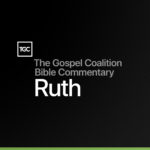Editors’ note: This series analyzes perplexing passages of the Bible. Previously:
- Dan Doriani on Matthew 24:15–16
- Miles Van Pelt on Judges 11:29–40
- Mark Gignilliant on Exodus 4:24–26
- Jimmy Agan on Matthew 15:26
- Dennis Johnson on Revelation 21:1
- Greg Beale on Revelation 13:8
- Miles Van Pelt on Judges 16:1–3
- Jack Collins on Psalm 2:7
- Stephen Dempster on 1 Samuel 28
- Tremper Longman on Ecclesiastes
- Ardel Caneday on Hebrews 6:4–8
- George H. Guthrie on Hebrews 13:2
I love to visit old battlefields. Whether it is the battleground in Philippi where the forces of Antony and Octavian faced those of Brutus and Cassius (42 B.C.) or the plateau of Masada where the Jewish zealots held out for months against the Roman Tenth Legion or the fields of Gettysburg where the Union Army under Meade defeated the Confederate forces of Lee.
These battlefields bring to mind important events of the past, and teach valuable lessons that ought not be forgotten. As George Santayana famously said, “Those who cannot remember the past are condemned to repeat it.”
Isaiah 65:20 is an important eschatological battlefield. And although much ink has been spilled analyzing it, it is beneficial for us to revisit the scene of the struggle:
There will no more be in it, a suckling child of a few days, or an old man who will not fill out his days. For the young man will die the son of a hundred years. And the sinner a hundred years will be cursed. (author’s translation)
This verse fits into a larger passage including verses 17 to 25 in which Isaiah prophesies the reality of a new heavens and a new earth. It is an eschatological text dealing with the end of days.
Popular Interpretation
Once the context is set, verse 20 gets tricky and has been subject to various interpretations. Perhaps the most common interpretation is that verses 18 to 25 cannot refer to the final new heavens and earth since verse 20 mentions death and, of course, there is no death in the final state.
A note in the New Scofield Reference Bible (1967) gets at the heart of that perspective:
Verse 17 looks beyond the Kingdom Age to the new heavens and the new earth, but verses 18–25 describe the Kingdom Age itself. Longevity will be restored, but death, the “last enemy” (1 Cor. 15:26), will not be destroyed until after Satan’s rebellion at the end of the thousand years (Rev. 20:7–14).
In other words, verse 17 refers to the final, eternal kingdom, but verses 18 to 25 are concerned with a 1,000-year reign of Christ on the earth.
Problematic Interpretation
This conventional interpretation is problematic on at least two levels.
1. It is contextually disruptive.
There is no sense of a time shift between verses 17 and 18. In fact, there is a true sense of divine continuity between the two in terms of timing: In verse 17, God proclaims (using a participial form), “I am creating a new heavens and a new earth,” and then in verse 18 he twice employs the same participle encouraging his people to be glad over that which “I am creating” and, in particular, that “I am creating Jerusalem.”
Additionally, Isaiah 66—the following chapter—clearly speaks of the final, eternal kingdom. (See, for example, “the new heavens and the new earth” mentioned in verse 22.) There is nothing in the original text to indicate 65:18–25 is parenthetical or an intercalation or interpolation.
2. The millennialist position does not take the text literally.
It is important to define the term literal in the context of biblical interpretation: It means the interpreter determines the meaning of a text according to the intention of the author.
For example, when David says in Psalm 22:6a, “I am a worm and not a man,” it’s obvious he doesn’t intend to convey that his physical makeup has been altered. Rather, David is employing a metaphor to describe his position before his enemies, and his foes are scorning him as they would a worm. To understand Psalm 22:6a metaphorically is to understand it literally.
Isaiah 65:20 is best interpreted this way, too.
Proper Interpretation
The point of Isaiah’s metaphor in 65:20 is that in the new heavens and new earth there will be no more untimely deaths. In the eternal kingdom, children won’t die in days of suckling, nor men in days of youth. All will have longevity of days.
And indeed, those 100 years old will be considered mere youth. In the new heavens and new earth, people will no longer be cut off by death, and the injustices of life will vanish. The verse doesn’t imply death will be present, but simply underscores that one of the great blessings of the eternal kingdom will be longevity.
Isaiah expresses this reality by employing figures we know, and his use of metaphor highlights the differences between this age and the age to come in a way we can easily understand.
Other details of the text, including verses 18 to 25, indicate this is not about an eschatological hope in a millennial reign of Christ, but rather the eternal reign of Christ. Verse 19, for example, declares that “no more shall be heard in it the sound of weeping”; Revelation 21:4 echoes this verse, and sees it as a mark of the final kingdom (Rev. 21:1). Additionally, in Isaiah 65:18 God’s people are commanded to “be glad and rejoice forever”; the believer’s joy is not merely for a 1,000-year period, but forever.
Comfort to Believers
Isaiah’s eschatological battlefield is worthy of visitation since it reminds us of previous battles over the same turf. Derek Thomas provides a succinct and helpful summary:
The passage describes a new heavens and a new earth (65:17), calling upon the faithful to rejoice forever (65:18) because it will be a condition where there is no weeping, or distress (65:19). There will be no death in heaven (65:20), or any kind of violence (65:25).
We do well to understand various views in order to avoid repeating past interpretive errors. Isaiah 65:20 communicates good news that provides deep comfort for all who are in Christ Jesus. The terrible brokenness of this world will one day disappear as the Lord of creation makes all things new.
Is there enough evidence for us to believe the Gospels?
 In an age of faith deconstruction and skepticism about the Bible’s authority, it’s common to hear claims that the Gospels are unreliable propaganda. And if the Gospels are shown to be historically unreliable, the whole foundation of Christianity begins to crumble.
In an age of faith deconstruction and skepticism about the Bible’s authority, it’s common to hear claims that the Gospels are unreliable propaganda. And if the Gospels are shown to be historically unreliable, the whole foundation of Christianity begins to crumble.


































